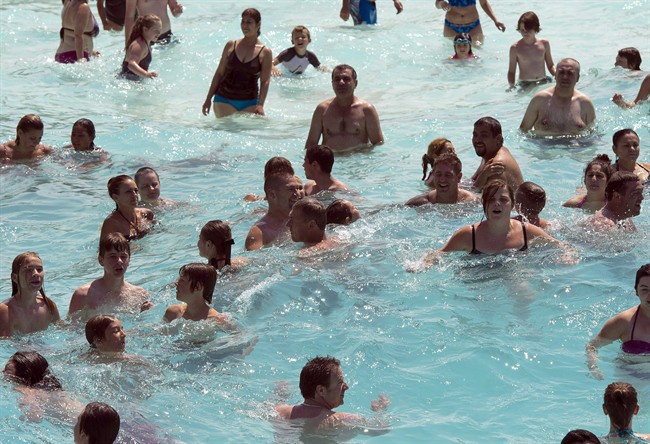Sixty-six Montrealers died from extreme heat during the 2018 heat wave, confirmed Dr. Mylène Drouin, regional director for public health at CIUSSS du Centre-Sud-de-l’Île-de-Montréal (CCSMTL), Wednesday.

However, compared to previous years, Montreal Public Health stated there were less heat-related deaths in 2018.
WATCH BELOW: Death toll rises as Quebec heat wave continues (July 2018)

In future, it recommends focusing efforts on taking care of people in places at highest risk.
“Low income and social isolation are also important risk factors during heat waves,” Drouin added.
Public Health’s investigation shows that the homes of 66 per cent of people who died were located in the city’s heat islands.
Drouin pointed out 80 per cent of these people died in their homes.

Get weekly health news
Among those who died, 72 per cent suffered from chronic diseases, 66 per cent were 65 years of age and over, 25 per cent had schizophrenic disorders and 18 per cent suffered from alcohol and addiction, according to Public Health.
READ MORE: By 2100, 75% of the world’s population will face deadly heatwaves
The City of Montreal says it will be implementing a prevention plan to prepare for a possible heat wave this summer.
Public health is proposing community-based interventions and increasing vegetation coverage in boroughs.
READ MORE: Montreal heat wave prompts more calls to Urgences-Santé
“Trees are considered a green infrastructure of major importance for our city, and is one of the reasons why we are making a major investment of over $16 million in urban forests this year,” said Laurence Lavigne-Lalonde, the member of Montreal’s executive committee in charge of ecological transition and resilience.
“One thing is certain: we understand that it is urgent to fight climate change.”
Last year, Montreal Fire Department Operations Chief Benoit Garneau told Global News that Urgences-Santé responded to 1,200 calls a day — 200 more than normal.
WATCH BELOW: Montreal braces for summer heat wave (June 2018)

“Thirty of these calls were directly related to the heat wave. Probably more were indirectly related.”
In 2018, according to Urgences-Santé, many of the calls were from people showing signs of heat stroke, including symptoms like dizziness, fainting and exhaustion.




Comments